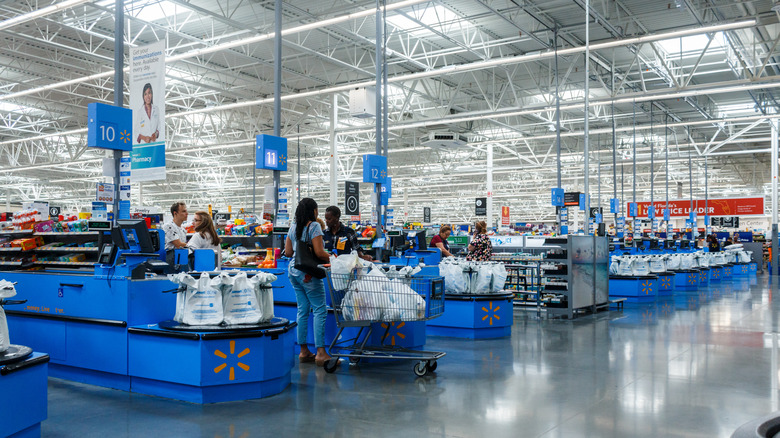The Possible Reason Walmart Failed In Germany
In the U.S., Walmart reigns as one of the top brands in a bustling retail market. According to Fortune, Walmart is not only the world's largest private employer but the biggest company in the world by its revenue alone. So while the supercenter has humble origins in Arkansas, it now boasts stores in 24 countries, per Walmart. Although most of the company's locations are based in the U.S., Walmart also has a large presence in Mexico and Canada.
Despite its success, Walmart has faced its fair share of failures just like anyone else. The chain is not a household name for everybody as you might expect. One of the retail giant's biggest fails comes from a stint in the late '90s when it tried its hand at opening some stores in Germany, per Better Marketing. The result left the chain with a huge loss, with the price tag exceeding a whopping $1 billion, says The Guardian. But if Walmart has done so well in many other countries, what changed with Germany?
The downfall of Walmart in Germany
Many German shoppers were just not on board with Walmart markets. To start, Walmart has a unique selling platform, one that The Guardian dubs "American style." Some German customers weren't ready to accept the cultural differences associated with Walmart's hyper-friendly employees and customer service, per The Guardian.
Additionally, Walmart's traditionally low prices were not met with open arms but actually got the chain into some pretty hot water. When Walmart first opened in Germany, some regulators accused the chain of trying to put other local shops out of business with its initial low costs, per the Institute for Local Self-Reliance. (Although there is a reason why Walmart groceries are so cheap.) In addition, the chain faced fierce competition from similar German chains that also offered a supercenter feel. In fact, according to Walmart, after the chain shut down its center in Germany, they were almost instantly scooped up by Walmart's German competitor, Metro.
So, eight years after opening its doors in the European country, Walmart eventually cut its losses and left. Despite the huge setback, Walmart still seems to be thriving as the retail giant it is. But this is far from the first disappointment a retail chain has experienced when trying to expand.
Why retailers falter away from home
While Walmart was not able to match its usual success in one region, it's not the only chain that has had the same problem. Sometimes, things just don't work out as planned, and what might be considered the best grocery store in America can be completely overlooked in another country. There's always a risk with taking something out of its element, and according to Harvard Business Review, this reigns especially true for many big retailers like Walmart.
Why? Most areas tend to prefer familiar local shops over large, international chains, says Harvard Business Review. For example, the British grocery chain Tesco faced a lot of challenges when trying to take their business into France. Customers in France simply wanted to stick with what they knew. Home Depot faced a very similar bout of disappointment when it attempted to create markets in China, per Forbes. In this case, the cause of the failed launch was thought to be due to Chinese attitudes toward DIY projects, with most people opting to hire outsiders to do the work instead of themselves.
Retail fails like this are all too common. According to Harvard Business Review, those uncertainties have ensured that not just one grocery retailer has the upper hand in the world's biggest markets.


